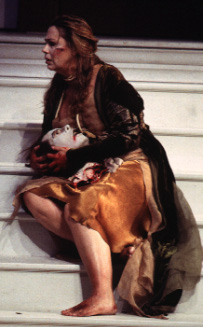For this section I wish to discuss just a few telling examples of the use of masks in Greek Theater. All these plays were chosen with the intent to show the mask as a means of mediating an emotional or plot driven relationship with the audience. They were also meant to display the element of recognition within Greek Theater.
Sophocles’ Electra is a dramatic and cruel version of the Electra story. In the story, Orestes and Electra are presented as little more than animals overwhelmed with bloodlust. This cruelty allows one of the best recognition scenes in all of theater. After the completely unthinking murder of Clytemnestra, Orestes, her son, and Electra, her daughter, take her body and mask it using a shroud. Upon Aegisthus’ arrival they tell him the corpse is body of Aegisthus’ main rival, Orestes. Happily going to unmask the corpse to reveal the identity of his enemy, Aegisthus uncovers someone else: his beloved wife Clytemnestra. This example shows us the ways in which the shroud helped first to act as the means through which the deception could be created. It also created a doubling effect, since Orestes was both onstage and supposedly under the shroud. Finally it acts as a plot deception trick, which the audience and the siblings are privy to, but not Aegisthus.
Oedipus Rex, by Sophocles is another great example of a play where a mask acts a mediator of relationship between interior and exterior selves. We all know the story of Oedipus: killed his father, slept with his mother, blinded himself, and then went into exile. But, what does this story actually mean? Oedipus’ story is one of hidden identity within oneself, much like the discovery of the “other” in mimesis. At the beginning of the play Oedipus wears the mask of the proud king of Thebes. Then of course, we discover along with him that when he thought he was a stranger, he was a native, when we thought he was a husband, he was actually a son. Oedipus, is a story of blindness and sight, hidden identity and recognition. When this recognition of Oedipus’ identity occurs Oedipus goes into the house, the female, or “other’s” terrain, and performs what I wish to call a change of mask. What I mean by this is that he doesn’t actually change the mask he is wearing, they merely tie fabric around his eyes to imply his blindness. In “The Greek Mask” I have outlined the importance of eyes within the mask, so for Oedipus to have stripped himself of his eyes, he has stripped himself of the power of his mask, leaving his true identity out in the open for all to see.
Finally, I will briefly talk about the role of mask in Euripides’ The Bacchae. The Bacchae is a very difficult play to talk about, because of all the different ways masking plays a role. A whole essay could be dedicated to masks and their use in The Bacchae, so I would like to focus solely on one brief instance within the play; the moment at which Agave enters holding her son’s head as a trophy. Now, in modern theater bringing a dismembered head on stage is often a problem. It is hard to find something that makes a believable head. I had a friend last year who spent three weeks developing different methods of representing a bloody head in a bag until she reached a satisfying option. However, thanks to the mask in Greek Tragedy this is not a problem. All throughout the story Pentheus’ mask has served as his head. Therefore, it only takes the removal of the mask offstage for Pentheus to be beheaded. As for the actual dramatic moment represented here, perhaps it is important to notice that when Agave enters she is under the influence of Dionysus’ ekstasis, making this a hyperaware situation onstage. We have Agave, a male citizen dressed as a female under the influence of madness, and we have Pentheus’ head, a mask once used on an Athenian male who was convinced by Bacchus to cross dress to see his mother in her madness. Onstage we also have Agave’s father Cadmus still dressed in the trappings of a follower of Dionysus, but completely unaffected by madness. It is only because of Cadmus, a man who respects and understands the powers of Dionysus that Agave is able to escape her madness and understand her tragic action. This is a play commenting on the nature of deception, trickery, and masking.

